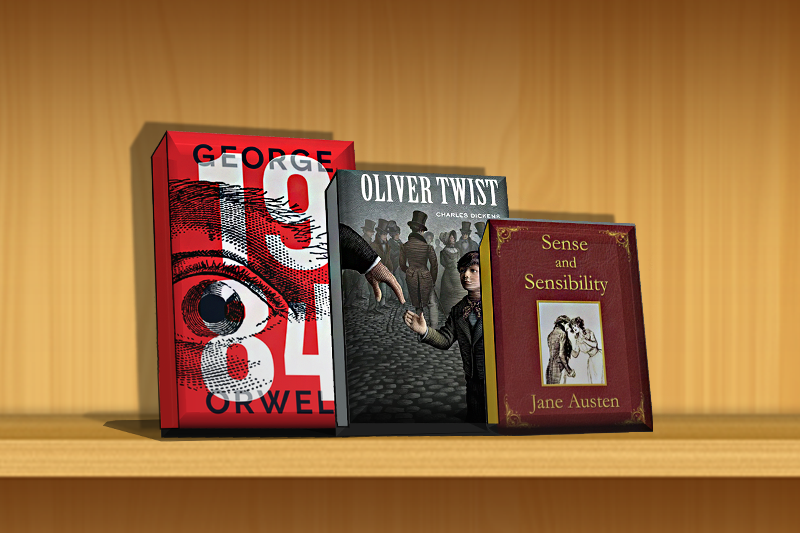My favorite T-shirt has a picture of Jane Austen, famed author of “Pride and Prejudice,” sporting sunglasses alongside a quote that says, “I put the ‘lit’ in literature.” Ignoring the dad-joke quality of this pun, old-time novels and their writers are truly some of the greats.
Sleep-inducing plots, barely readable language and lengthy sentences might come to mind when we think about older novels. However, classic literature is so much more than the snoozefest you were forced to read in English class. It is a portal to historical society, capable of opening your eyes to unchanging truths surrounding the human character.
Antique literature houses moral lessons that remain eerily relevant in modern society. Take “The Hunchback of Notre-Dame” by Victor Hugo. This French gothic novel explores the unrequited feelings of a kind hearted but grotesque hunchback for an alluring gypsy dancer. The illusion of appearances is explored through Quasimodo, the disfigured bell-ringer of Notre-Dame.
Despite his monstrous appearance, Quasimodo possesses a beautiful heart, revealing that external appearances don’t always reflect true character. After she recognizes his compassion, a deep friendship blossoms between Esmeralda, the enchanting Roma dancer, and the deformed hunchback.
Claude Frollo, the malicious priest, also embodies the deception of appearances through his sinful lust after Esmeralda. Clergymen are meant to display purity and abstinence, but Frollo’s unethical conduct lays bare the ugly truth behind his honorable status. Evidently, not all that glitters is gold. Judging the inner qualities of a person rather than their external facades is extremely applicable in our highly visual society.
While classic novels sharpen your moral compass, they also enhance your conversational skills. Those seemingly tedious sentences and wearisome words heighten your ability to effectively engage in meaningful conversations. The exposure to more complex language makes stringing thoughts together and expressing your emotions come with ease.
Plus, we all bask in the light of sounding smart to our peers. Dropping some Jane Austen lines and casually quoting Shakespeare will automatically elevate you to genius status among friends and family.
Dabbling in Charles Dickens and taking a stab at John Steinbeck can reduce cognitive decline as well. A study conducted by the National Library of Medicine in 2020 indicated that consistent reading of classic works among the elderly reduced mental deterioration through the formation of new brain pathways.
A study from Michigan State University in 2012 also revealed incredible cognitive responses to classic literature. When students read novels by Jane Austen, increased blood flow in their brains reached beyond the cerebral regions associated with intense concentration. In other words, reading older literary pieces is more stimulating than watching a movie or solving complex math problems.
Unlike solving brain-aching mathematics, reading classic literature is actually entertaining. As far-fetched as that sounds, I speak from experience.
Reading has always been my greatest pleasure, but the extravagant language and uneventful plots turned me off from the classics. I would’ve rather read “Percy Jackson” for the millionth time than take a peek at Tolstoy. But after I read “Sense and Sensibility” by Jane Austen, my eyes were opened to the mystical world of old-time literature. The elegance, humor and insight of Austen’s work intrigued me, and I embarked on a quest to discover other classical authors.
After diving into the Brontë sisters, developing an obsession for C.S. Lewis and falling in love with Emily Dickinson, I realized the classics had become my favorite genre to read. The next time you spot a classic at the library, check it out. The more you read, the more thrilling the intellectual challenge becomes.
For students, piling more reading onto your mountain of school-related stress sounds terribly unappealing. Even so, classic novels are the key to unlocking your full academic potential.
We all know the feeling of reading a passage during an English test and having no clue what it’s trying to communicate. Through the savior that is olden literature, you can polish your critical thinking skills and interpret any passage without breaking a sweat. The classics often introduce difficult topics only understood through fierce concentration. The more you exercise this focus, the easier it becomes to comprehend simpler forms of writing.
This also comes in handy on standardized tests. For high schoolers, the SAT is the bane of our existence. If the English portion of the exam drives you up the wall, the College Board provides an extensive list of suggested reading material to study. And guess what? All the books on this list are classic novels. You’ll find the adventurous “Don Quixote,” the disturbing “Lord of the Flies” and the fascinating “Brave New World” among many other iconic titles. It suffices to say that the College Board has good taste.
Most classical literature dates between 1600 and 1900, but their relevance has not diminished in the slightest. From philosophy to unsettling societal truths, these classics are just as befitting today as they were upon their release.
The benefits of reading classic novels are endless, but ultimately, reading olden literature makes you a better person. By examining the tensions of our past and recognizing the consistency of human nature, you’re introduced to new worlds of thought that remain relevant in modern society. Through meeting complex characters and processing advanced texts, you build empathy and hone your critical thinking skills.
There are always doors to explore in the mystical hallway of classic literature. Delve into the authors who put the “lit” in literature, and don’t miss out on the greatest opportunity to enhance all areas of your life.
Life-changing or time-wasting?
Here are some of the best literary classics, as well as those that should be burned.
“Pride and Prejudice” by Jane Austen: Austen’s signature wit and wisdom come to life in this iconic love story between vivacious Elizabeth Bennet and handsomely rich, but proud, Mr. Darcy. The lively dialogue, comical characters and hilariously awkward interactions make this regency romance absolutely essential for any bookworm. 5/5
“The Giver” by Lois Lowry: If you ever need to waste your time, read this lackluster utopian novel. The gaping plot holes, lazy ending and dull writing style are just as riveting as watching paint dry. 2/5
“Fahrenheit 451” by Ray Bradbury: Despite portraying a dystopia, this novel reflects the direction of modern society by exposing the dangers of censorship and divulging profound societal truths. Bradbury’s riveting bestseller is a must-read for those who appreciate a philosophical challenge and a nuanced writing style. 5/5
“Wuthering Heights” by Emily Brontë: Never turn a page of this book unless you want to be thoroughly disgusted. This Gothic romance is full of psychotic characters and completely crazed lovers. The protagonists are selfish and highly unstable, and the sequence of the plot is utterly disorganized and confusing. 1/5
“Anne of Green Gables” by L.M. Montgomery: Perfect for readers who love a lighthearted coming-of-age story, this entertaining classic narrates the endearing adventures of Anne Shirley. You will find a kindred spirit in this fiery 11-year-old as she discovers life and love at her new home at Green Gables. 4/5
The abridged version of this article appeared in the Fall 2023 print edition. This is an uncut version.




Derricka • Sep 13, 2024 at 9:13 pm
I enjoy your writing style. I actually slowed down to read all of your words instead of skimming! All the best in your in writing career journey! I also liked your article about webtoons. I have a lot of webtoon site subscriptions, LOL.
Abigail Kim • Jun 3, 2024 at 2:27 pm
The world would be better off without music.